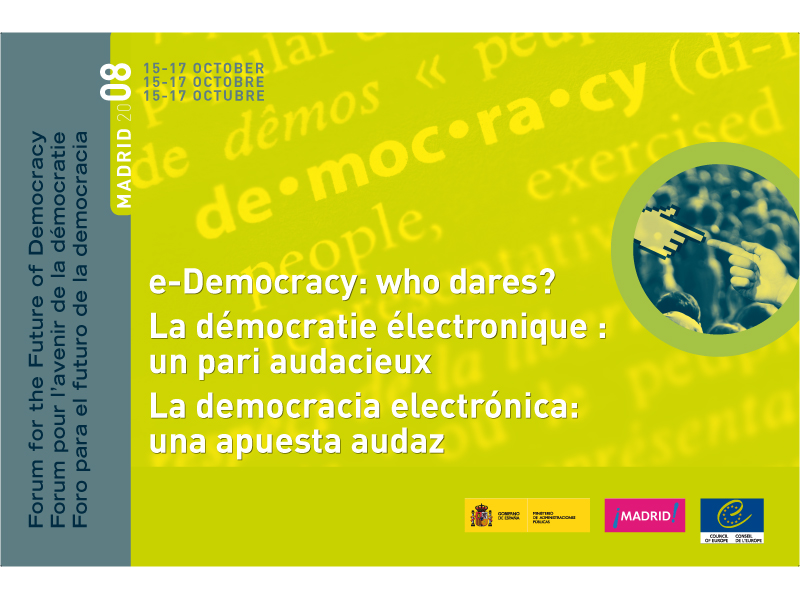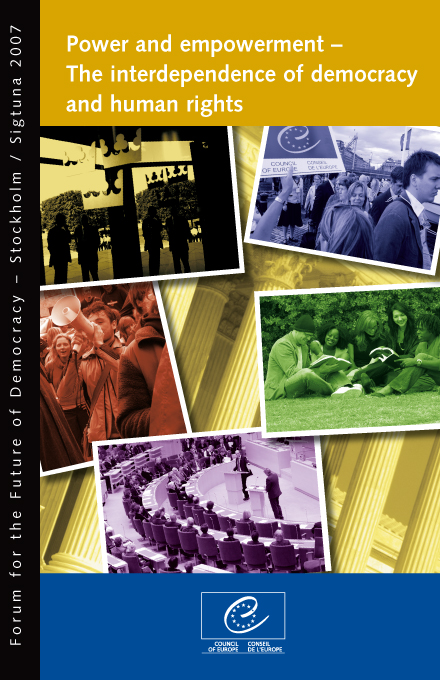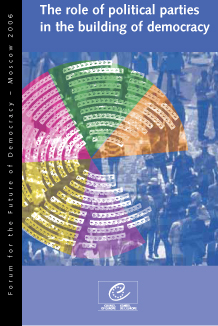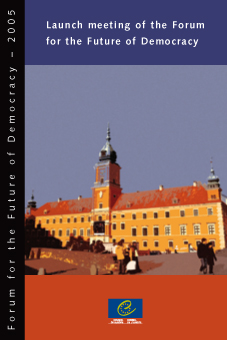Part I. Challenges and opportunities
There is nothing novel about European democracies’ having to face challenges and opportunities coming from major changes in their external environment. They have done this repeatedly in the past and, despite occasional reverses (the period between the first and second world wars comes immediately to mind), they have been much more successful than autocracies in dealing with such threats to their existence. The reasons for this relative superiority are multiple.
First, democracies generate more accurate information about the interests and passions of their citizens. They may seem to be more contentious and less efficient in the short run – precisely due to their freedoms of expression, assembly and petition – but they will be better equipped to cope with changes in individual preferences and intensities when they do get around to reforming their institutions and practices.
Second, democracies have internal mechanisms of accountability and responsiveness that prevent rulers from under- or over-reacting to such external threats. Despite the frequently decried danger of “populism”, the interests and passions of citizens – once filtered through the competition and co-operation of their politicians/representatives – usually result in more measured and apposite responses.
They also tend over time and with occasional deviations to make collective decisions that are regarded as legitimate – even by those negatively affected by them. Citizens may grumble about inattentive and unresponsive rulers, but they conform more willingly to what is demanded of them than in the most enlightened dictatorship or technocracy because their political rights are better protected and, therefore, they are more confident that they will be on the winning side in the future.
One could perhaps argue that the challenges and opportunities embedded in the present European context are exceptionally diverse and strong. Certainly, we are condemned to live in “interesting times” in which both the rate and the scale and the scope of change seem to be unprecedented and, most important, beyond the reach of the traditional units that have heretofore dominated its political landscape. Most of today’s problems are either too small or too large for yesterday’s sovereign national states and, hence, within Europe there has been a vast amount of experimentation with devolution to smaller political units and integration into larger ones. For the first time, knowing the level of aggregation at which reforms should take place has become almost as important as knowing the substance of the reforms themselves. The classic question Que faire? has to be supplemented by Où faire?
Moreover, because they are coming from a relatively “pacified environment”, the democracies affected will find it difficult to resort to “emergency” measures or “temporary” suspensions in order to pass reform measures against strong opposition. Granted that rulers will be tempted to enhance the sense of urgency by highlighting new threats to security and responses to them (such as “the war on drugs”, “the war on terrorism”, or “the fear of foreigners”) and to exploit them for the purpose of inserting anti-democratic reforms, but the plurality of sources of information and the competition between politicians should limit this possibility in most well-functioning democracies. The key problem will be finding the will to reform existing rules with the very rulers who have benefited by them and who usually cannot be compelled to do so by an overriding external threat to their security or tenure in office.
One generic issue dominates all speculation about the future of democracy – namely, how well do its well-established formal institutions and informal practices “fit” with the much more rapidly changing social, economic, cultural and technological arrangements that surround it and upon which democracy depends both materially and normatively? Let us take an abbreviated look at “the usual suspects” in that surrounding context.
Globalisation
Definition. An array of recent transformations at the macro-level that tend to cluster together, reinforce each other and produce an ever accelerating cumulative impact. All of these changes have something to do with encouraging the number and variety of exchanges between individuals and social groups across national borders by compressing their interactions in time and space, lowering their costs and overcoming previous barriers – some technical, some geographical, but mostly political. By all accounts, the driving forces behind globalisation are economic. However, behind the formidable power of increased market competition and technological innovation in goods and services, lies a myriad of decisions by national political authorities to tolerate, encourage and, sometimes, subsidise these exchanges, often by removing policy-related obstacles that existed previously – hence, the association of the concept of globalisation with that of liberalisation. The day-to-day manifestations of globalisation appear so natural and inevitable that we often forget they are the product of deliberate decisions by governments that presumably understood the consequences of what they decided to laisser passer and laisser faire.
Guiding rival hypotheses. (1) Globalisation narrows the potential range of policy responses, undermines the capacity of (no longer) sovereign national states to respond autonomously to the demands of their citizenry and, thereby, weakens the legitimacy of traditional political intermediaries and state authorities; (2) Globalisation widens the resources available to non-state actors operating across national borders, shifts policy responsibility upward to trans-national quasi-state actors – both of which undermine established oligarchic arrangements and promote the diffusion of new trans-national norms of human rights, democracy and “good governance”.
European integration
Definition. The direct impact of European Union directives and regulations upon member, candidate and adjacent states and the indirect effect of continuous and varied interaction of politically relevant European actors, tend to produce a gradual convergence towards common norms and practices and, hence, a reduction in the persistent diversity of norms and practices that have historically characterised the European “region”.
Guiding rival hypotheses. (1) European integration tends to undermine established national practices of democratic participation and accountability without replacing them with supranational practices of a corresponding nature and importance; (2) European integration through the “conditionality” that it imposes on candidate and member states and the legal supremacy of European law over norms in existing member states tends to promote higher and more uniform standards of democratic performance at the national and sub-national levels.
Inter-cultural migration
Definition. The voluntary and involuntary movement of persons across previously more closed and secured national borders and the permanent residence of increasing numbers of foreigners, especially of non-European origin, within European societies.
Guiding rival hypotheses. (1) Migration and the co-existence of cultures previously separated from each other tends to generate a negative reaction on the part of “native” inhabitants of more culturally homogenous European countries. This finds its expression in xenophobic movements, ultra-nationalist political parties and racially motivated incidents that undermine the authority of established political organisations and agencies, and force existing national (and, eventually, supranational) governments to adopt policies restricting further in-migration. This has a secondary impact on the rights of national citizens and the stability of existing political competition; (2) Migration and co-habitation of foreigners have a positive impact upon the practice of democracy at several levels of aggregation since they diversify the bases of political competition, compel rulers to pay attention to previously ignored issues and, in the longer run, contribute to the formation of more diverse collective identities and more tolerant citizens.
Demographic trends
Definition. Change in the demographic profile of European societies in the direction of lower birth rates and higher proportions of elderly people.
Guiding rival hypotheses. (1) Aged people are more likely to vote, join associations and, hence, acquire the political influence needed to appropriate an increasing share of public funds and policy benefits for themselves. This leads to youth disaffection with politics on the grounds that rulers have to pay increasing attention to the aged (and may themselves be increasingly aged); (2) Demographic shifts, especially in their territorial impact (and when combined with compensating foreign in-migration), are bringing about long overdue redistributions in political representation and public policy that will enhance regime legitimacy and economic performance – provided that politically disaffected youth subsequently become engaged citizens.
Economic performance
Definition. The combined effect of several economic components, involving rates of growth, levels of employment, rates of inflation and distributions of income and wealth, upon citizens’ perceptions of individual and collective well-being.
Guiding rival hypotheses. (1) Decline in economic performance in Europe, especially relative to that of the United States, leads to a perception among citizens that their democratic institutions are serving them badly and that they should be reformed in a more “American” direction; (2) Decline in relative and objective economic performance is not perceived as a corresponding decline in quality of life and, therefore, leads to a reaffirmation of the distinctiveness and value of the “less liberal” political institutions of (continental) Europe.
Technological change
Definition. The rapid, unpredictable and uncontrollable diffusion of changes in technology across political borders – whether by shared knowledge or commercial competition – and its impact upon the way in which citizens, representatives and rulers exchange information and communicate among themselves and with each other.
Guiding rival hypotheses. (1) The acceleration in technological change, especially in the information and communication technologies, reduces the absolute cost of exchanges, protects the autonomy of users, and lowers relative disparities of access among citizens, and between them, their representatives and their rulers, thereby not only increasing political equality but making it easier to hold rulers accountable; (2) This accelerated technological change only reduces transaction costs for a privileged segment of persons in favoured countries and opens up wider disparities between those who can and those who cannot exploit it, thereby adding new elements of discrimination and bias to the political process.
State capacity
Definition. The ability of existing permanent governing institutions, especially at the national level, to carry out effectively and autonomously (“in a sovereign manner”) the tasks which rulers have assigned to them and which citizens expect them to fulfil.
Guiding rival hypotheses. (1) In the present international/interstate context (see especially the headings “globalisation”, “European integration”, “technological change”, and “sense of security” in this listing), the governing institutions of previously sovereign national states find it increasingly difficult to extract sufficient resources, to regulate behaviour and, hence, to satisfy effectively and efficiently the expectations of their citizens – and this causes a decline in the prestige and legitimacy of rulers; (2) While the above-noted changes in the external context do restrict the performance of national states, they also contain incentives for shifting governing tasks to both the sub- and supranational level of aggregation and these institutions “beyond and below” the nation state are becoming increasingly (if gradually) capable of satisfying citizen expectations and generating political legitimacy.
Individuation
Definition. The shift, due to changes in working conditions, living contexts, personal mobility and family structure, in the locus of identity and collective action from large (“encompassing”) historically generated socio-political categories such as class, race, religion, ideology and nationality to much more fragmented and personalised conceptions of self-interest and collective passions.
Guiding rival hypotheses. (1) Individuation at the level of interests and passions undermines the tendency of citizens to support, join and act in conjunction with more encompassing political organisations such as parties, trade unions and nationalist movements, produces a structure of intermediary associations that is more specialised in purpose and less connected in action than in the past, leads to a decline in the ability of polities to pursue overriding “general” or “public” interests and, ultimately, to a decline in the legitimacy of democracy; (2) Individuation may undermine traditional forms of collective action, but it provides powerful incentives for creating new intermediaries that are more flexible in their structure, participatory in their decision making, capable of forming (and re-forming) networks for the production of public goods of overriding general interest, and this leads to the legitimacy of new forms of democracy.
Mediatisation
Definition. The tendency to acquire information about politics and to receive political messages exclusively from a plurality of sources in the mass media, but especially television and the Internet, that are in commercial competition with each other for the attention of consumers and the profit of owners.
Guiding rival hypotheses: (1) Mediatisation destroys previously well-established mechanisms whereby citizens discussed politics directly with each other (and their children) and obtained their information and proximate identity through distinctively public and political intermediaries such as parties, associations and unions, and replaces them with a commercial nexus that trivialises information about politicians and exploits their personal rather than political actions; (2) The growing plurality of sources, the privatisation of ownership and the competition between firms for consumer attention liberates the media from control by rulers and insulates them from partisan manipulation, thereby creating a more diverse and accessible “public sphere” from which citizens can extract information more easily and in which they can participate virtually at much lower cost and effort.
Sense of insecurity
Definition. An increase in the perception of avoidable risks and the magnitude of their probable consequences for vulnerable individuals and groups due either to threats external to one’s own society or to damaging behaviour from one’s own co-citizens.
Guiding rival hypotheses: (1) The manipulation by rulers of this growing sense of insecurity, especially that due to foreign non-state actors (such as terrorists), reduces basic freedoms and promotes aggressive (“pre-emptive”) behaviour that undermines institutions of the accountability of rulers to citizens and distorts the competition and co-operation of democratic representatives; (2) Efforts by rulers to exploit insecurity in order to avoid accountability will generate a reaction among previously apathetic groups of citizens that will resuscitate pre-existing parties, associations and (especially) movements in defence of threatened freedoms and provide a basis for the foundation of new intermediary organisations.







 Print
Print  Send
Send  FRANCAIS
FRANCAIS